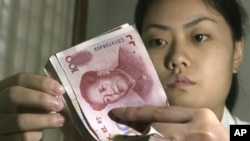Chinese banks usually issue about a third of their loans each year during the first three months. Banking analysts say there are signs that lending continues to be brisk despite efforts by Chinese authorities to contain inflation by limiting the amount of money in the financial system.
Banks lent 7.95 trillion yuan or $1.2 trillion last year, topping the government target of 7.5 trillion yuan. Chinese banks have been on a lending spree since 2009, when China implemented a massive stimulus to help counter the impact of the global economic crisis.
Andy Rothman, a China strategist at the Shanghai office of investment bank CLSA, says Chinese authorities will scale back lending this year to about the same level as before the stimulus period.
"What I think we’re going to see is what I would describe as mildly accommodative monetary policy this year," Rothman said. "Which really means continued normalization back to the growth rates for credit liquidity that we saw in the five pre-stimulus years. I think we are going to see new lending of between $7 and $7.5 trillion."
Rothman downplays China’s inflation risk, saying prices will moderate as the surge in food prices in recent months was largely weather-related. He expects China’s inflation rate to average 4.5 percent this year. Inflation in November surged to a 28-month high of 5.1 percent.
China raised interest rates twice last year and increased the amount of money banks have to keep as reserves to tighten money supply. Rothman expects interest rates to increase not more than half a percentage point this year, which he says will happen in the first half.
The Chinese central bank set the yuan’s trading reference rate to a new high of 6.59 per dollar Thursday ahead of President Hu Jintao’s visit to Washington next week.
On Wednesday, U.S. Treasury Secretary Timothy Geithner again called for a more rapid appreciation of the yuan. A stronger yuan could help China manage rising prices as imported raw materials for its exports become cheaper. Many U.S. politicians and business leaders say China keeps the yuan artificially weak, which makes imports from the United States and other countries more expensive.
Economists Warn More Credit Tightening Ahead in China




